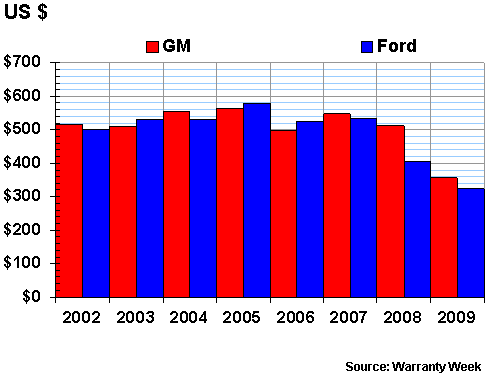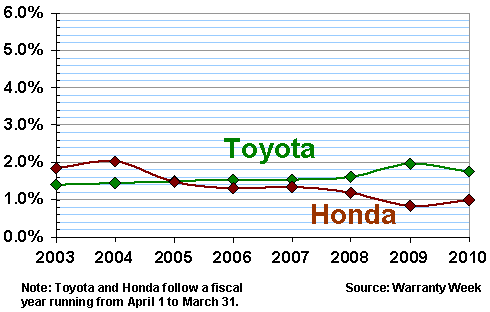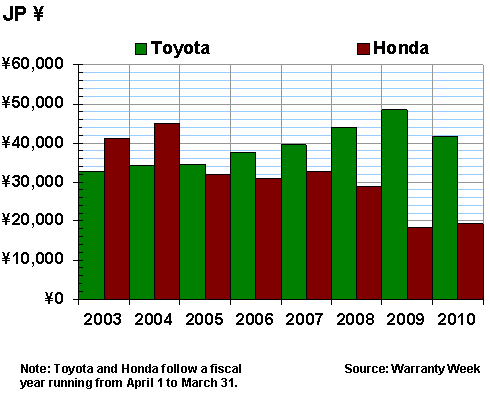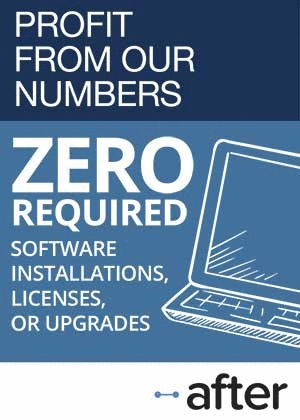Auto OEM Accruals per Vehicle:Measured as a percentage of revenue or as an amount of money set aside per vehicle sold, warranty accruals have declined dramatically for Ford and GM. Some warranty metrics even put Ford slightly ahead of Toyota, though Honda remains the low-cost champ.
As the American automotive industry wraps up its annual Fourth of July holiday furlough, it's once again time to take a look at the warranty expenses of some of the top automotive OEMs in Europe and Japan.
With the continued help of longtime reader Stephan Jegl, managing director of AWM Conseil & Management, who also contributed his fluency in German, French and Italian to last year's OEM roundup (in the July 23, 2009 newsletter), we have once again extracted warranty data from the annual reports of BMW, VW, Daimler und Fiat.
New Warranty Data
All four European automotive OEMs recently published their annual reports for the calendar year 2009. Last week, they were joined by Toyota and Honda, which both published their annual reports for the fiscal year ended March 31, 2010. As a result, along with annual data previously published by General Motors and Ford, we now have detailed warranty data from eight of the world's top manufacturers of passenger cars and light trucks.
We'd love to compare the eight companies and make some conclusions about product quality and repair costs. But there are two major problems with the data. First, it comes denominated in three different currencies: the U.S. dollar, the Japanese yen, and the euro. As anyone who follows the financial headlines knows, the exchange rates between those currencies has fluctuated widely in the past few years. And this has impacted the relative value of each company's warranty reserves.
Second, the massive slowdown in unit sales, and the resulting reduction in automotive revenue, has caused warranty claims rates to soar for reasons that have nothing to do with product quality or repair cost. Quite simply, they're fixing old cars with new money, and since there's less new money coming in, the ratio between claims and sales has risen all by itself. And the value of the warranty claims rate as a benchmark has fallen.
Therefore, we're going to avoid making comparisons across currencies or between continents. And we're going to avoid the warranty reserve balance and the warranty claims rate as metrics, so as to not mistake the appreciation in the yen or the decline of the euro for a true change in warranty costs.
Warranty Accruals Only
Instead, we're going to look at accruals only, because there's less lag time between when a car is sold and when the money is set aside to finance future repairs. The theory is that within a single currency, the amount of accruals made per vehicle sold should remain the same unless there has been a change in quality or repair cost.
For instance, if an automaker set aside €400 per vehicle in 2008, and both quality and repair costs have remained about the same, they should have set aside €400 per vehicle in 2009 as well. Even if sales volumes went up or down, the accrual per vehicle should have remained the same. Less sales means less accruals -- always in proportion.
If, however, the accruals are made in yen by a Japanese manufacturer, for a car manufactured, sold and repaired in Europe, the amount of accruals per vehicle will also have to factor in the yen-euro exchange rate. It still may require €400 in accruals per vehicle sold, but that equates to only ¥56,000 needed for a vehicle sold this year, as opposed to ¥68,000 for a vehicle sold two years ago. But that 18% reduction has nothing to do with quality or repair cost and everything to do with exchange rate fluctuations.
Grouped By Currency
Keeping that uncertainty in mind, we're presenting the data on the eight OEMs in three groupings, expressing accruals as both a percentage of automotive revenue and as an amount per vehicle sold. But we're keeping the three currencies separate. In the first grouping, we're looking at four European OEMs that report in euros. In the second grouping, we're looking at two American OEMs that report in dollars. And in the third grouping, we're looking at two Japanese OEMs that report in yen.
The European OEMs have enjoyed a reputation for high quality and low warranty costs combined with a low amount of research on their actual costs. And had it not been for the research of Stephan Jegl, that might still be the case.
In Figure 1 below, the warranty accrual rates of three European OEMs have apparently converged in the 2-to-3% range in the past two years, while the accrual rate of Volkswagen has increased to a rate just fractionally below its 2004 peak level of 5.8%.
Figure 1
European Automotive OEMs
Product Warranty Accruals, 2002-2009
(as a % of automotive revenue)
In the last seven years, VW has only once set aside less than 5% of its automotive revenue to finance warranty work. We suspect this has something to do with local taxes and labor rates in VW's markets, as well as other factors such as product mix and the cost of replacement parts.
But it's worth noting that even in this small group of four European OEMs, VW's warranty costs are far different from its competitors. Or let's put it this way: VW is the world's largest known warranty provider, spending €4.37 billion (US$6.1 billion) on warranty claims last year. That's about 1-1/2 times what GM spent, and about 1.7 times Toyota's annual claims cost.
We've never seen warranty data from other top OEMs such as Nissan, Hyundai, Renault, Suzuki, or PSA Peugeot Citroën, and we haven't seen Chrysler warranty data in about three years. But it's hard to fathom how any of them could possibly be outspending VW. And outside the auto industry, there are very few candidates approaching that size in terms of warranty claims (e.g. VW's $6.1 billion is roughly the same as HP's and Dell's annual totals combined).
Accruals Per Vehicle
In terms of cost per vehicle, however, VW is actually more towards the middle of the pack, as can be seen in Figure 2 below. In 2009, VW set aside only €858 per vehicle, far below the €1,293 level in accruals per vehicle seen at Daimler during the same period.
However, keep in mind that Daimler also has a higher average price per vehicle, so €1,293 translates into a lower percentage of its revenue. And VW sells four times as many vehicles worldwide as Daimler (thanks to sales in China, VW's unit total actually increased in 2009). So the differences in the accruals actually make sense, given the differences between the product lines.
Figure 2
European Automotive OEMs
Warranty Accruals per Vehicle, 2002-2009
(in euro)
As can be seen in Figure 2, Daimler has set aside the most money per vehicle for each of the last three years. BMW held that title in 2002-2005. And VW held it ever so briefly in 2006. Daimler's €1,554 total in 2007, however, remains the highest accrual rate per vehicle ever seen among these eight companies. Just for comparison's sake, that was twice as much per unit as BMW, and more than seven times as much as Honda.
And then there's Fiat, which spends a relatively low percentage of its revenue on warranty work and sets aside a relatively low amount per vehicle as well. Hopefully, some of this cost control discipline will rub off on Chrysler, of which Fiat now owns 20%. We haven't had any warranty statistics for Chrysler since its spin-off from Daimler, but we haven't stopped hoping they'll one day fill in the gaps by including some old warranty data in the prospectus for a possible initial public offering of shares.
The American Tale
The other major American OEMs are both continuing to recover from the wrenching market dislocations of 2008 and 2009, of which we'll say little. And although we're cutting off their data in these charts at the end of 2009, the cost control has apparently continued into early 2010.
In Figure 3 below, GM ended 2009 with a 2.5% accrual rate. In the first quarter of 2010, that rate dropped under 2.0%. Meanwhile, Ford ended 2009 with a 1.5% accrual rate, and that figure held steady at that relatively low level in the first quarter.
Figure 3
American Automotive OEMs
Product Warranty Accruals, 2002-2009
(as a % of automotive revenue)
One could make some comparisons between the companies in Figures 1 and 3 and draw some conclusions, but that would involve assumptions about multiple currencies, warranty durations, labor rates, parts cost, local taxes, recall policies, and accounting rules.
In other words, don't do it. It might be valid to compare the warranty expenses of close competitors such as GM and Ford, or perhaps Daimler and BMW, but any comparison that pits a European luxury brand against a U.S. company known for its trucks and compact cars is only going to mislead.
However, there is still an amazing story to be told in the facts of Figure 4. Here you have two iconic American brands -- one that went bankrupt and the other that many expected to -- making a meaningful change in their warranty cost, just when they needed it most.
Massive Cost Reductions
Ford cut its accruals from $533 per vehicle in 2007 to only $324 per vehicle in 2009. GM cut its accruals per vehicle from $548 in 2007 to $357 in 2009. That means GM reduced its accruals per vehicle by 35% in only two years. In Ford's case, the reduction in accruals was 39% per vehicle sold, again in only two years.
Figure 4
American Automotive OEMs
Warranty Accruals per Vehicle, 2002-2009
(in U.S. dollars)
Yes, the number of vehicles sold worldwide also fell precipitously over that two-year period (by 20% for GM and by 26% at Ford). But remember, we're calculating the accruals made per vehicle actually sold. If it's not sold, there are no accruals. The accrual rate per vehicle sold should remain unchanged unless there's a change in product quality and/or repair cost.
So that's the amazing story. Despite a deep recession, and in GM's case, a Chapter 11 filing, these two American OEMs reduced their warranty costs per vehicle significantly from 2007 to 2009. The only other OEM to come close to such a massive cost reduction was Honda, with an estimated 33% decrease in accruals per car over the past two years.
In contrast, Toyota reduced its accruals per vehicle by only 5% in the past two years. But keep in mind that Honda and Toyota end their fiscal years three months after the other six OEMs. So that means we're comparing a rate at the end of March to a rate at the end of December. And as we know at least in the case of Toyota, lots can go wrong in the space of a few months.
The point is that with millions of units sold in multiple markets, accruals shouldn't change that fast (up or down). The 5% change at Toyota (and the 2% change at VW since 2007) are more the norm. Which makes the declines seen in Figures 3 and 4 all the more remarkable.
Japanese Trends
In Figure 5, one can see that Toyota's accrual rate fell a bit in the most recent fiscal year, while Honda's rose a bit. The same trend is evident in Figure 6, which measures accruals per vehicle.
Figure 5
Japanese Automotive OEMs
Product Warranty Accruals, 2003-2010
(as a % of automotive revenue)
As can be seen in Figure 5, Toyota's accrual rate peaked at 2% of revenue in fiscal 2009, the same period that Honda's accrual rate fell below 1%. In fiscal 2010, Toyota's accrual rate per vehicle fell from the peak of ¥48,445 it saw the year before, while Honda's accrual rate per vehicle remained at a relatively low level of ¥19,274 per passenger car. In dollar terms, those accruals per vehicle are $447 and $207, respectively (US$1.00 = ¥93).
We should note, however, that Honda also sells motorcycles and portable generators. To arrive at our passenger car estimate, we made some assumptions about warranty costs per unit for those other products, and subtracted them from the company total. And if our model is wrong, then we're measuring a 33% decline in our assumptions about Honda's product line, rather than the actual accrual rate per vehicle.
Figure 6
Japanese Automotive OEMs
Warranty Accruals per Vehicle, 2003-2010
(in Japanese yen)
So what does all this mean? Here's the reason we've injected so much doubt about the value of making comparisons in the face of volatile exchange rates and differences in product lines: Though the lowest accrual rate per vehicle in any currency is Honda's, the second and third lowest are Ford's and GM's.
Toyota is in fourth place, in terms of the amount of money set aside for warranty work per vehicle sold. Also, Toyota is in third place in terms of the amount set aside as warranty accruals as a percentage of revenue, behind Honda and Ford.
Toyota has always been among the leaders in quality and warranty cost. But Ford? And where are the Europeans? Or more precisely, why are their warranty costs so much higher? It can't all be taxes.
Ford Tied With Toyota?
On the claims side, Toyota is holding onto second place, with a 1.95% claims rate seen in the year ended March 31. Honda remains in front, spending only 1.09% of its product revenue on warranty claims in the most recent fiscal year. But here comes Ford, with a 2.01% claims rate seen in the quarter ended March 31.
In other words, on the claims side, Ford is now separated from Toyota by what would ordinarily be a rounding error: 0.06%. Of course, things can change quickly and we won't have any new warranty data from Toyota or Honda until June 2011. But already it looks like Ford has increased its product quality levels and reduced its warranty costs to what used to be Japanese-only levels.
| 













